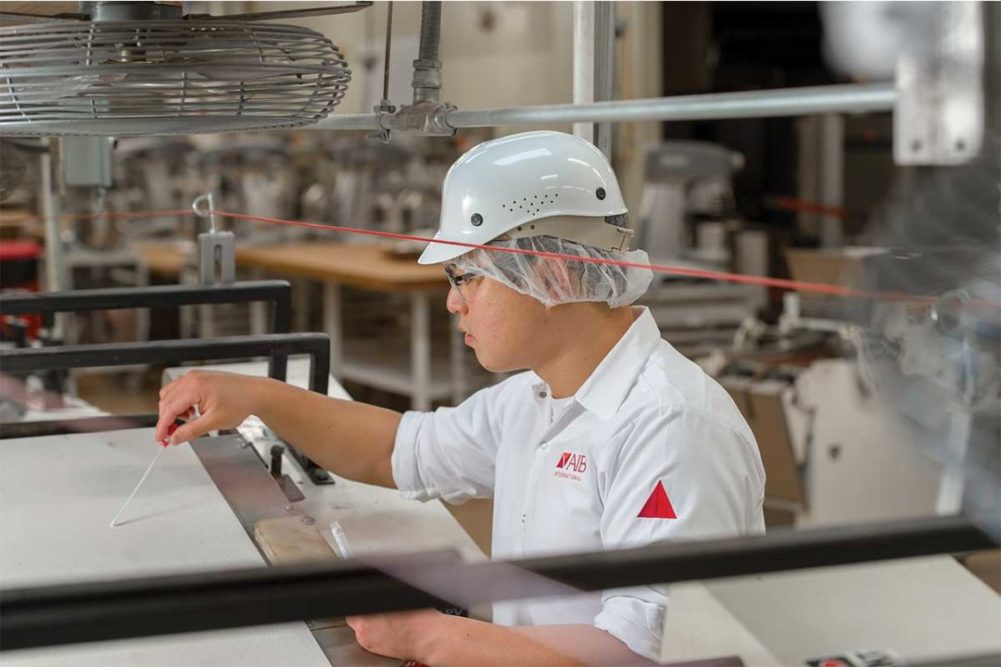As far as COVID-19 is concerned in line with foodborne illnesses, bakers may be able to rest easy.
“As recently as February of this year, USDA and FDA again underscored that current epidemiologic and scientific information shows no transmission of COVID-19 through food or food packaging,” said Rasma Zvaners, vice president, regulatory and technical services, American Bakers Association.
But airborne transmission remains viable, making upgrades in HVAC systems and compressed air systems a priority for some sites. Bret Zaher, operations manager, AIB International noted that changing filters to a higher MERV/micron rating helps with purity, and using point-of-use filters protects places where compressed air comes into contact with product or packaging.
“Many customers are now requiring their air to be tested on an annual basis for yeast, APC/TPC and/or mold,” he said. “Airflow studies are often conducted to ensure adequate and proper flow of the air is occurring to ensure that proper positive and negative air pressures are achieved, especially in the high-risk areas of the plant.”
Gina Reo, president of Quality Assurance Strategies LLC, pointed out other tests that have come into increasing demand over the past three years include those for allergen adulteration, which has been the most prominent item noted by the FDA from 2017-20.
“The baking industry sector tends to be the hardest hit with allergen adulteration recalls,” she said. “Generally, causes are found to be from labeling error or mis-labeling, missed ingredient on label or formulation error.”
Some of the biggest current recalls are centered on undeclared allergens. Mr. Zaher noted that an allergen program that includes ingredients, packaging supplies, processing aides, sanitation, storage practices, handling procedures and employee welfare are key to success. He advised that sites increase the frequency of their labeling checks for proper product packaging, annual reviews of a site’s ingredients to prevent new allergens in raw materials and ensuring that old labels are discarded and not stored with new labels. He also cautioned that sourcing from alternate suppliers and making emergency purchases can introduce new allergens that were not present in the primary supplier.
And the list of allergens that need to be claimed on labels must be updated avidly.
“Recently, the Food Allergy Safety, Treatment, Education and Research (FASTER), introduced the FASTER Act, S. 578, which would add sesame as a major allergen and was unanimously passed by the U.S. Senate,” Ms. Reo said. “The bill will now move to the House of Representatives where it awaits a vote. Bakers will need to prepare for this new allergen, as likely it will pass congress.”
Foreign materials are causes for concern, even with the advancement of foreign material control devices over the years. To prevent metal and glass recalls, Mr. Zaher said sites have been updating to metal detectors with the capability of detecting smaller pieces of metal. Color sorters and x-ray devices are being added for additional foreign material control, and shatterproof light and window replacements in older production sites reduce potential glass breakage, he said.
Jessica Burke, delivery partner relationship manager, British Retail Consortium Global Standards (BRCGS), warned manufacturing sites that needed to close down parts or all of production during the past year are beginning to resume operation and will face enforced changes in the workplace environment, potential labor shortages, and supply chain disruptions.
“Some sites will be busier than ever with additional demand, while others will need to pivot to introduce new product lines,” she said. “These conditions are placing additional pressure on sites and stretching operations, which can impact food safety compliance.”
Quality assurance will not be allowed to be put on the backburner despite these conditions.
“In times of crisis, culture is more important than ever,” Ms. Burke said. “As operations resume, leadership, communication and empowerment are key.”





